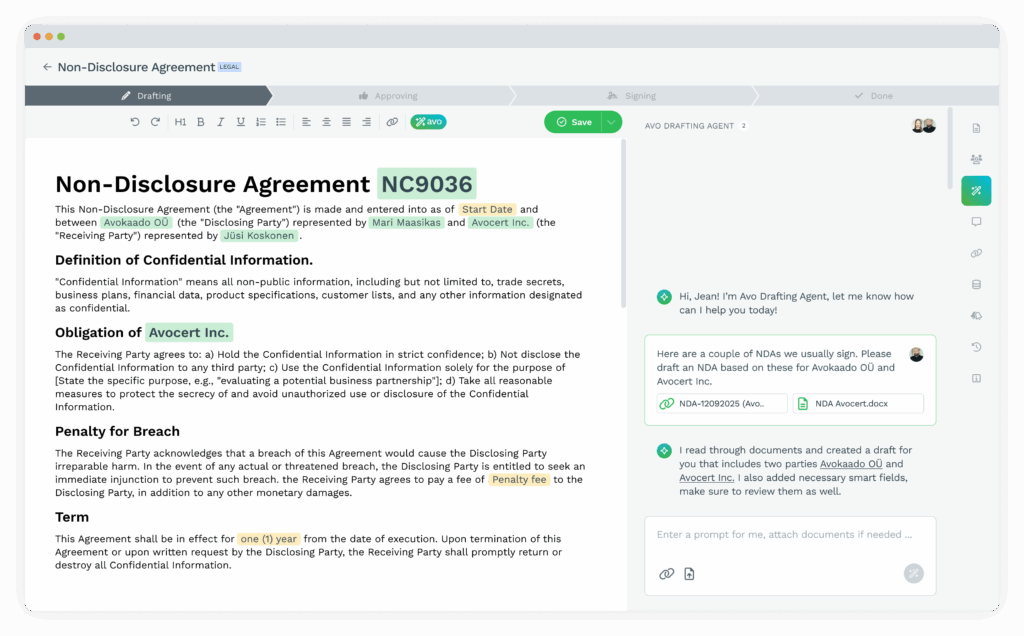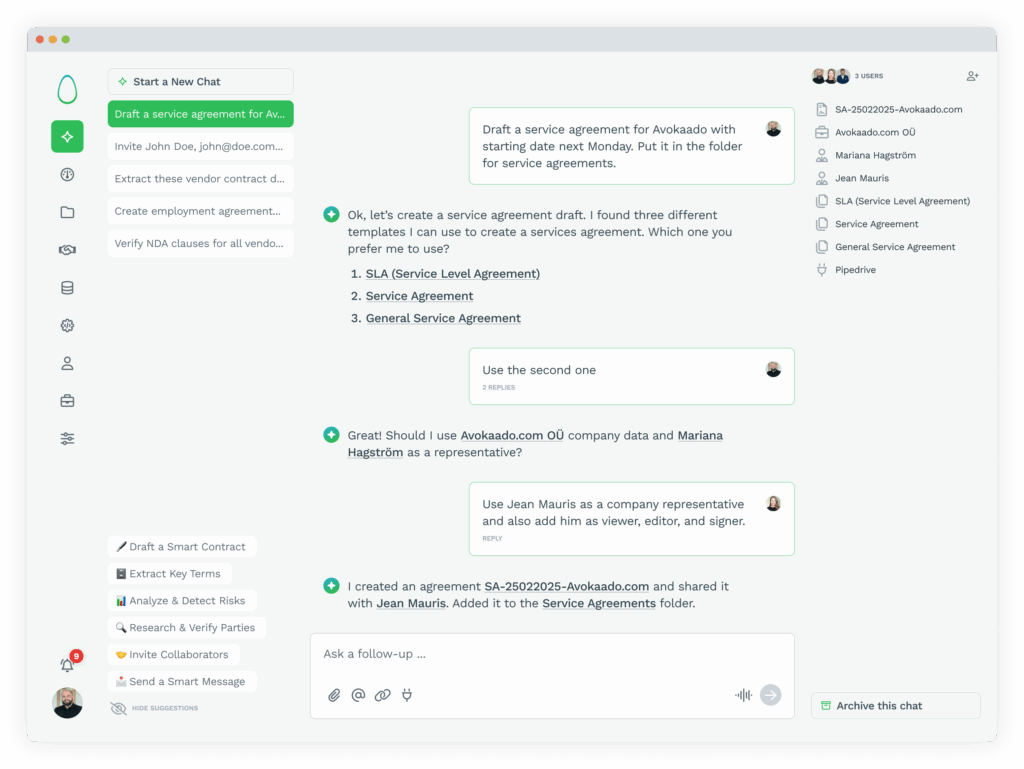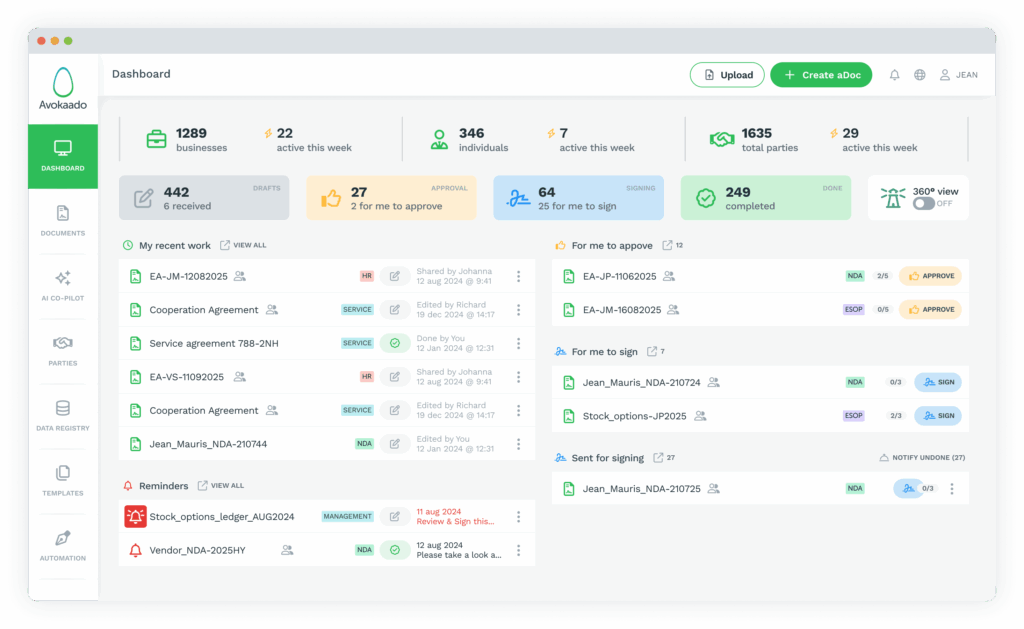For most businesses, contracts are critical but chaotic. They’re scattered across inboxes, cloud folders, and outdated templates. Legal teams spend days or even weeks managing reviews, chasing approvals, and mitigating compliance risks. The result is a bottleneck that slows deals, creates risk, and turns legal into a reactive cost center.
Avokaado is working to change that.
Headquartered in Estonia, Avokaado is a Contract Intelligence Platform built to bring structure, visibility, and control to every stage of the contract lifecycle. Legal, HR, sales, procurement, and operations teams use it to draft, manage, sign, and monitor contracts in a unified, data-driven environment. What sets the platform apart is its infrastructure-level approach: rather than offering another point solution, it replaces legacy tools with a single source of truth that turns contracts into connected, searchable, and automated assets.
“We saw that businesses weren’t failing at legal, they were being failed by legal infrastructure that hadn’t evolved,” says Mariana Hagström, co-founder and CEO of Avokaado.
Before founding the company, Hagström spent over a decade in legal practice, rising to managing partner at a top-tier law firm. Despite her success, she kept seeing the same problems repeat: siloed knowledge, unscalable processes, and limited access to legal services.

“Every time someone left, knowledge disappeared. Every new deal started with an old Word template. It was inefficient, risky, and exhausting,” she recalls.
The idea for Avokaado began to form after attending the Nordic Business Forum, where leaders across industries were rethinking how core operations should work. Inspired, Hagström sketched out a new type of contract environment – one that replaced Word files with logic-driven documents and enabled companies to build contract workflows that aligned with how they actually worked.
That sketch became Avokaado’s first product: a document format called aDoc, which embedded business logic directly into contracts. It was the foundation for what the company would build next – a full platform that connects contracts, parties, and data in real time.
Getting there wasn’t easy. Hagström initially bootstrapped the company, hiring developers while continuing to manage her law firm. The early product was ambitious but lacked focus, trying to serve too many use cases at once. It was a lesson in building too much before deeply understanding the customer.
“Validation has to come before velocity,” Hagström says. “We had to go back, narrow down, and build with the people we wanted to serve.”
That focus paid off. Avokaado began gaining traction with complex, compliance-heavy sectors like telecommunications, BFSI, and the public sector, where fragmented systems and manual contracting processes often cause the biggest slowdowns. Customers appreciated the platform’s EU-built foundation, its support for local compliance standards, and its ability to support both central legal teams and decentralized business units.
Today, Avokaado is designed to help companies move from legal chaos to operational clarity. The platform replaces multiple tools—e-signing platforms, lifecycle trackers, DMSs, and shared folders—with one structured environment. Contracts become data assets. Legal teams set the rules, and business teams can operate with autonomy and accountability.

The platform includes features like:
- Contract Intelligence Infrastructure – Real-time connections between documents, parties, and terms enable oversight, risk monitoring, and automated workflows.
- AI Agents (Avo) – A suite of four purpose-built AI agents called Avo, such as Drafting, Review, Insights, and Compliance, operating on structured legal data, not PDFs.
- Company-wide Usability – Built for teams beyond legal, with guardrails that ensure compliance and consistency.
- Advanced Template Logic – Automates even complex contracts through conditional clauses, integrated data sources, and clause-level editing.
- EU Compliance by Design – Native e-signature and GDPR-compliant data storage, localized for European markets.
- Expert-led Onboarding – Dedicated consultants guide teams through setup, without needing internal IT resources.
“We’re not trying to make legal tech look smart,” says Hagström. “We’re trying to make legal operations actually work for the business.”
A key shift came when Hagström was introduced to co-founder Jean Mauris, a seasoned product leader with a systems mindset. Together, they restructured the roadmap and refocused the company around scalable infrastructure for contract workflows. That change allowed the company to stabilize, grow, and deliver faster outcomes for customers.
The company’s core philosophy is that contracts are not just documents, they’re operational infrastructure. When structured properly, they can drive decisions, enforce obligations, and reduce risk. When fragmented, they create delays, friction, and hidden liabilities.
“Our mission is to give legal the systems it needs to become a strategic advisor, not a bottleneck,” says Hagström. “That means shifting from PDF management to data management, from chasing signatures to enabling smarter decisions.”
Avokaado’s latest development is its AI agent layer, launching under the name Avo. Unlike generic contract AI tools that scrape unstructured documents or rely on limited pattern matching, Avo operates on structured legal data from day one. The platform’s proprietary aDoc format, together with a connected party registry and template governance system, allows Avo’s agents to reliably draft, review, analyze, and monitor contracts without hallucinations.

Four agents, such as Drafting, Review, Insights, and Compliance, work together to support the full contract lifecycle. Each is governed by an AI infrastructure designed to be transparent and adaptable, including customer-selectable multi-model LLMs such as OpenAI, Claude, or Gemini.
“We didn’t build Avo to chase trends,” says Hagström. “We built it because our customers needed contract intelligence they could actually trust. Something that fits into their stack, follows their rules, and delivers value from day one.”
Looking ahead, Avokaado’s roadmap includes expanding this infrastructure into a true operational backbone. New layers will support predictive insights, risk alerts, and compliance forecasting, turning contracts into a forward-looking intelligence system. By separating infrastructure from interface, Avokaado is giving legal and business teams not only automation, but agency.
As businesses increasingly prioritize speed, visibility, and control, the need for structured contract infrastructure is becoming essential. Avokaado is betting on that shift and building the systems to support it.
For Hagström, success isn’t about raising the next round or reaching a certain valuation. It’s about knowing that the platform is helping companies build faster, safer, and more connected operations.
“Contracts power everything from sales to hiring to partnerships,” she says. “When you fix how they work, you don’t just make legal better, you make the whole business stronger.”













